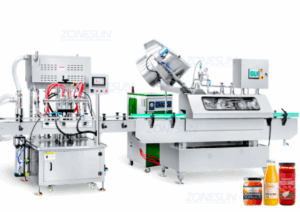Running a food production business requires both precision and efficiency. One of the most effective ways companies achieve this is by investing in an automatic sauce filling machine.
This equipment is specifically designed to handle semi-liquid or liquid products with accuracy, speed, and reliability, helping businesses scale while maintaining quality standards.

The Role of an Automatic Sauce Filling Machine in Modern Production
- Manually filling bottles, jars, or pouches with sauce may work for small-scale operations, but as demand grows, the process becomes too slow and error-prone. Spillage, inaccurate filling volumes, and longer production times can all cut into profitability.
- Unlike manual or semi-automatic solutions, a fully automated system manages the filling process with minimal human intervention. Machines are built to handle various viscosities, meaning they can process everything from smooth tomato sauce to chunky salsa or thicker cream-based condiments. Adjustable filling nozzles and programmable settings ensure that each container receives the correct portion, reducing waste and keeping packaging uniform.
- The automation not only speeds up production but also ensures consistency across every batch. For food businesses, this reliability strengthens trust with consumers who expect the same product quality and portion size every time they make a purchase.
Key Benefits of Using an Automatic Sauce Filling Machine
- Increased Productivity
One of the main advantages is efficiency. With an automatic sauce filling machine, businesses can fill hundreds or even thousands of containers per hour, depending on the model. This is significantly higher than what can be achieved through manual labor, allowing companies to meet growing demand without increasing staffing costs.
- Consistency and Accuracy
An automatic system guarantees precise portions every time, ensuring that every unit on the shelf matches in both volume and appearance.
- Reduced Waste
Spilled sauce or overfilled containers can create unnecessary waste, adding to costs and clean-up time. Machines are calibrated to minimize mistakes, keeping product loss to a minimum.
- Labor Savings
Instead of assigning several workers to fill and seal containers, a machine can complete the task with far less supervision. Staff can then be redeployed to quality control, logistics, or other areas where human oversight is more valuable.
- Versatility
Most machines are designed to work with a variety of packaging types, from bottles and jars to pouches and tubs.
- Scalability
As your business grows, an automatic sauce filling machine can be upgraded or paired with additional equipment such as capping machines, labeling machines, or conveyor belts.
Applications Across Different Businesses
The use of an automatic sauce filling machine is not limited to large-scale manufacturers. Small and medium-sized enterprises also find it valuable. For artisanal sauce makers, adopting automated equipment can help move from a local market presence to national distribution.
- Restaurants that bottle their signature sauces for retail can also benefit by streamlining production without compromising the homemade quality of their products.
Large factories, on the other hand, often integrate filling machines as part of a full production line that includes cooking kettles, mixers, cappers, and labeling systems. In this setup, the filling machine becomes the backbone of the packaging system, linking raw production with the final consumer-ready product.
Choosing the Right Automatic Sauce Filling Machine
Not every business has the same requirements, which is why choosing the right machine is important. Factors to consider include:
- Production Volume: Small operations may need a compact model, while large factories benefit from multi-head systems that can fill several containers at once.
- Container Types: Consider whether the machine can handle bottles, jars, or flexible pouches depending on your product packaging.
- Cleaning and Maintenance: Food safety regulations require easy-to-clean designs. Machines with quick disassembly features make sanitation more efficient.
- Budget and Scalability: Businesses should balance initial investment with the long-term savings in labor and waste reduction.
Why companies turn to automatic sauce filling machines
Adopting an automatic sauce filling machine is more than just a technological upgrade—it is a strategic decision. Automation reduces reliance on unpredictable manual labor, lowers long-term costs, and provides the reliability needed to meet both small and large orders. Furthermore, consistent packaging improves the customer experience, creating a stronger brand presence in competitive markets.
Food businesses also face increasing pressure to comply with safety and hygiene standards. Automated filling systems are typically designed with stainless steel and food-grade components, making them more compliant with industry regulations than traditional manual methods.
Final Thoughts
For food businesses that want to improve consistency, reduce waste, and increase output, investing in an automatic sauce filling machine is a practical and forward-looking choice. Whether you are a small producer looking to grow your market share or a large manufacturer aiming to streamline operations, this equipment provides the tools needed to stay competitive.
By ensuring every container is filled precisely and hygienically, businesses not only meet customer expectations but also build stronger, more efficient production systems. In a fast-paced market where quality and speed both matter, the automatic sauce filling machine stands out as an essential asset for long-term success.
